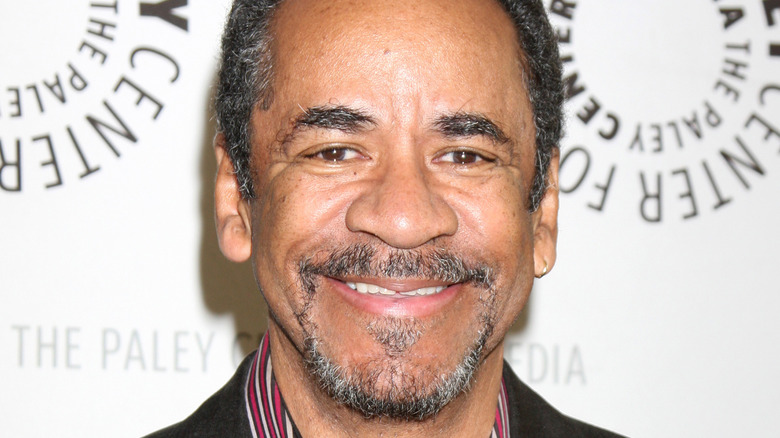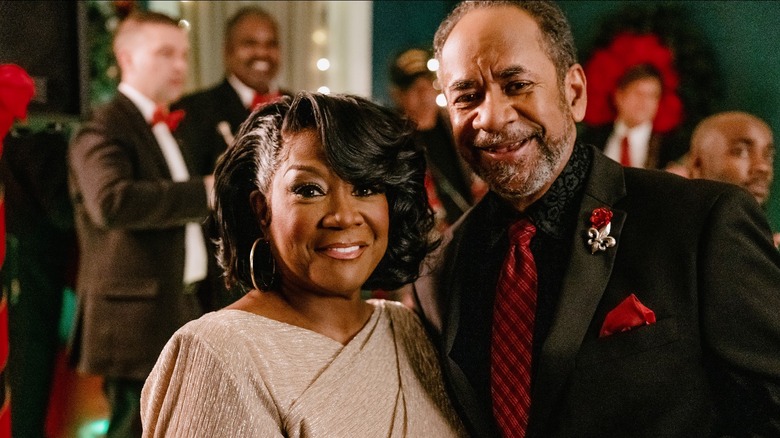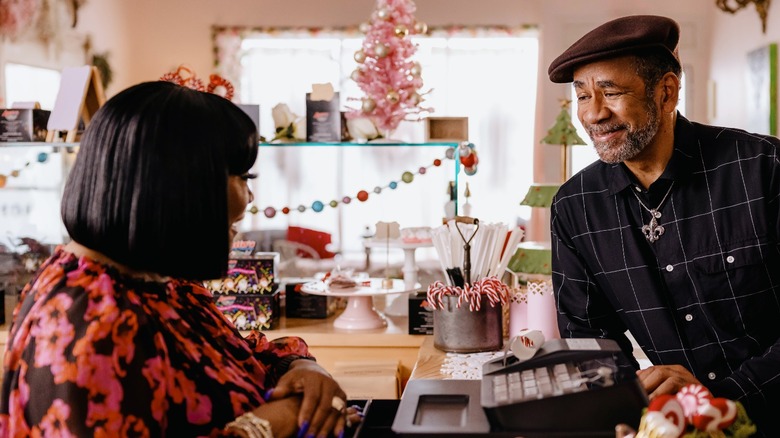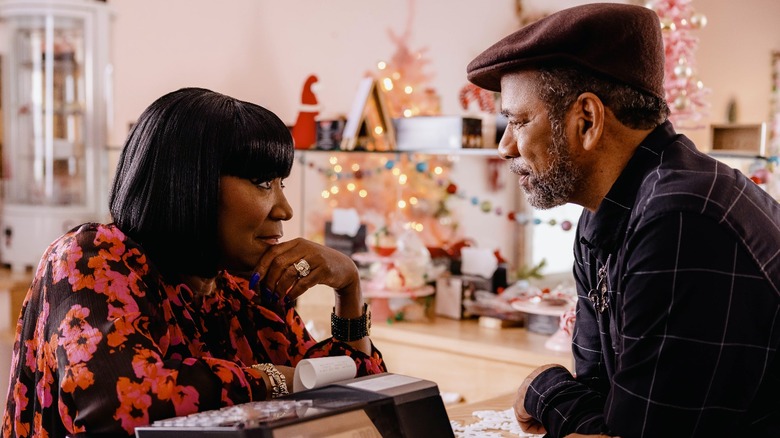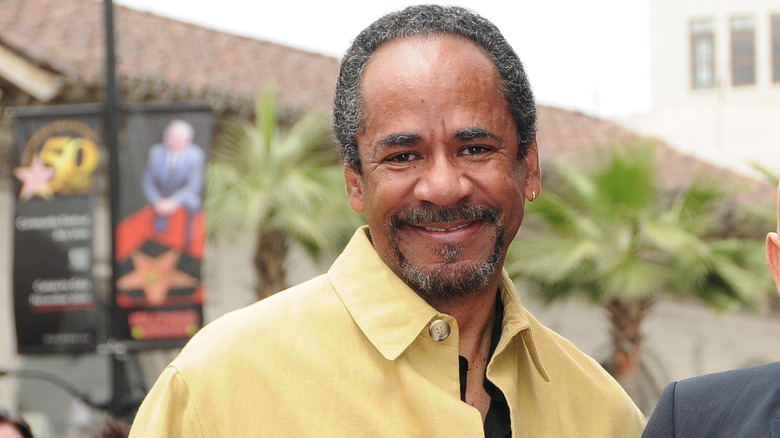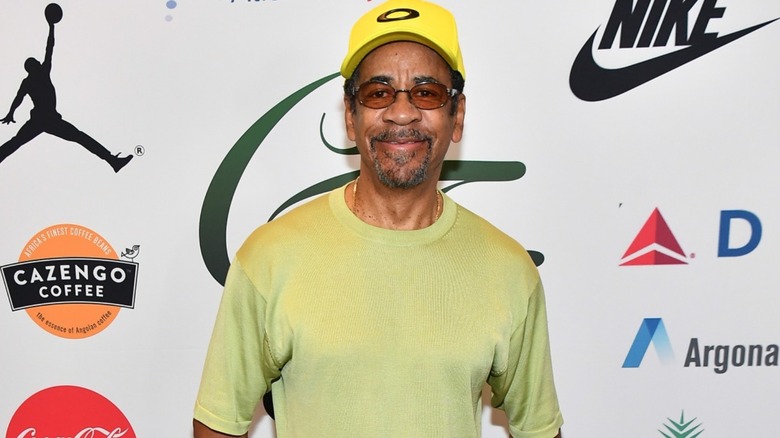Tim Reid's Favorite Parts Of Starring In Lifetime's A New Orleans Noel - Exclusive Interview
Tim Reid's career spans five decades and can speak for itself, featuring roles in classic television, like "WKPR in Cincinatti," "Simon & Simon," and "Frank's Place." In the '90s, he won over a generation as the father of Tia and Tamera Mowry's characters on "Sister, Sister." And since his time on Disney Channel, Reid has become something of a Lifetime movie regular, especially in the channel's beloved holiday movies. Most recently, Reid plays Patti LaBelle's love interest in "A New Orleans Noel."
In Tim Reid's exclusive interview with The List, the actor shared some of his secrets to a long career in the entertainment world. He told us, "I've had success; I've had failures. I've had a wonderful career. I regret none of them." The showbiz veteran also shared the best advice he's gotten in his career and talked about his experience filming "A New Orleans Noel" with an all-star cast, which includes LaBelle as well as real-life married couple Brad James and Keshia Knight Pulliam playing rival architects.
He followed this advice throughout his acting career
Your career has been happening since the '70s, and you're continuing with new film projects all the time, it seems. Do you have any advice for actors who want to have that kind of longevity in their careers?
That's a tough question because the game has changed so much since I started out, but I remember some of the advice that I received. Early in your career, one has to make a critical decision, strangely enough. That I was told when I was fumbling around some 50 years ago, trying to figure out if I wanted to give up a life and become a warrior trying to make it in show business. They said, "You got to know what you want." And I said, "What do you mean? I want to work." And they said, "No, no, no. Do you want to be a star, or do you want to be in the business for the rest of your life?" That seemed like a strange question. I said, "What do you mean?" ...
Back then, it was your name above the title because everybody was a star. You had to be in movies to be a star, and you had to have your name above the titles before you [could] be classified as a star. Now, anybody with a cell phone is a star, but back then ... He was a veteran of that era, and he was saying how all he wanted to be was a star. Sure enough, he became a star. His name was above the title. I forgot what the movie was — "Pirates of Tortuga" or something — and there it was. He went to the Chinese Theatre and sat up in the balcony on the opening day, and he saw his name go up, and he says, "I'm a star." Well, he stopped working; he didn't work much after that.
And he said, "So, what do you want?" I said, "Actually, I want to be in this business the rest of my life. This is what I want to do. I want to go out on the saddle." He said, "Well, then, you have to understand there're valleys and there're hills, and you have to keep reinventing yourself, and you have to work at being successful in business."
I think a lot of young people today, depending on what the context of a star is, think about the stardom. They think about the money, the fame, and they don't think about the career. And that's a choice you make. There's nothing wrong with it. This guy was a star. He made it to what he dreamed [of]. The universe has a sense of humor. It's probably one of the most fickle frequencies in the world — the universe's consciousness about us, subconscious about us.
Tim Reid is still in touch with former co-stars
A lot of audience numbers may know you from "Sister, Sister." Have you kept in touch with the rest of the cast?
I keep in touch with the cast as often as I can. We work together, occasionally. I probably see Jackée [Harry] and Tia [Mowry] more than I do Tamera [Mowry], but I see them. I see a few of the cast members from "WKRP in Cincinnati" who stayed together all these years. Back in the day, you would say it's like a family, and it really was a family back then. They become part of your life.
Do you get recognized still as Ray? Do people come up to you?
Yeah, I do. It depends on the age of the group. I've been fortunate. I've been in the business for a long time, so younger people know me from "Sister, Sister," now that it reruns on Netflix. Some of them know me from "That '70s Show." Some of the other people know me from "Simon & Simon." They know me from other things. The baby boomers know me from "WKRP in Cincinnati," and a few know me from "Frank's Place."
One of my favorite actor [moments] that I treasure — I was at an opening somewhere in the Midwest. ... I'm in a shopping mall, and the event was over, and I think we were broadcasting for a local radio station. Some people came up to get autographs, and a gentleman came up with his son and said, "My son would like to have your autograph."
And I said, "Yeah, sure." I think it was [promoting] "Sister, Sister." As I'm signing the autograph, he said, "This is amazing. I was my son's age when my father brought me up to you to sign an autograph for 'WKRP in Cincinnati.'" It's one of my favorite memories of my career so far. [There] was something about it that made me feel I had accomplished much of what I had dreamed of — being in the business [for the] rest of my life.
I'm sure so many people look up to your characters. Ray was such an incredible father figure for so many people.
Didn't have a clue, but he did his best.
Working with Patti LaBelle was 'wonderful'
You've been really busy with several Lifetime movies in the past couple of years. How did "A New Orleans Noel" stand out to you as a project?
Like anything that has to do with New Orleans, [I was] eager to be a part of [it]. It's one of my favorite places on this Earth. That was the first thing to be excited about. The second one was working with Keshia [Knight Pulliam] again. We had done a TV movie I think a year before that, [which] we shot up in Winnipeg. It was so cold, my god. It was the coldest I've ever been in my life. It was nice to have another opportunity to work with her. Then, of course, Patti LaBelle, a true legend. We hear the term "legend" a lot, even after me, but she's a true legend. I was looking forward to spending some time working with Patti, and it turned out to be a wonderful experience.
What was it like filming with a superstar? You guys had such good chemistry.
It was very, very natural, because when you admire someone, truly admire someone, like we all admire Patti ... She has such energy, and she wears her stardom well. A lot of people don't wear it well, but it lightens her. She brings a certain energy to the set. Even after the scene, as they give a cut and we set up, she still has a certain positive energy that you feel comfortable around. It was very, very comfortable being with her and doing the scenes. It was really a nice experience. You don't often get that with stars. Sometimes stars [act like], "I've had enough of this. I'm doing this for the money. Don't talk to me."
And you guys were filming on location in New Orleans for most of it?
Some of it was in Natchez, Mississippi, where I had never been. I had always tried to avoid that part of Mississippi, but it turned out to be an interesting experience. It's like walking back in time in [the] sense that there's so much history there, and not all favorable to people of African descent. But it was interesting to be in. It's a town that's still sort of in its own little interesting time war. People are nice. They're very nice to us. I had no negative experiences whatsoever with the people, both Black and white. But the town itself is sort of caught in [a] little interesting time of war.
Filming in New Orleans was a highlight
That must have been really interesting for a project you were filming. Did it affect the mood of the shoot at all?
No, no. It wasn't a negative mood. It was just the look, the feel [of] what we're doing. It actually probably added to it. There are cities I've had the pleasure of spending some time in [where] you can go out and shoot an American period piece dating back to the 16th century or 17th century and do a nice, wide shot.
In my home state of Virginia, a city called Petersburg, Spielberg shot "Lincoln" and he shot quite a bit of it in Petersburg. There were scenes where he literally did it at 360 and didn't have CGI in any buildings that [were] there. The buildings [from the period were] still standing. The house [where] Lincoln sat on that night before he was assassinated is still there. He was visiting some people. He sat on the porch, had a discussion [on] the folklore of the area, and those buildings still stand.
If you're doing period pieces, that's what I love about New Orleans. Even [if you're doing] a modern-day picture, there's something about the atmosphere, the way things look, that [makes it] easier to get into character. That Southern character, that Southern mystique is interesting no matter what period.
That's one of the themes of this movie — the new versus the old. It's a big architectural discussion. Do you fall on either side of that argument between those two architects?
No, not really. I think we've got to find a way, especially now, to blend, to change, to work with those things that will melt into the new way. It's either that or we destroy everything that we don't like and build something new, and [with] the time [that would] take, in that in-between time, what are people going to do? Are they going to keep fighting? Are they going to enjoy it?
We got to learn to work with the architecture, and also the attitudes of people, and somehow create that change, that blend that will ease and give people a better life. We've got to do that. If not, it's a constant struggle — constantly at odds with something or someone. Kind of boring, actually.
It was fun. It is very good for the soul.
Tim Reid is glad Lifetime makes so many Christmas movies
What do you think fans are going to enjoy the most about "A New Orleans Noel"?
[I] haven't seen it cut together, but the feeling on set with people who were working on it felt a lot like what was going on, in that you're looking at the past, and yet we are doing it in a modern way. And it's so different now. Everything is digital. Everything is a lot faster than [it] used to be because you can get away with things you couldn't get away with before. The film had [a bit of] that too, in the speed [at] which you work. To make these TV movies, you got to shoot them in two, three weeks. There is no rest in shooting. And of course, if you have weather issues, it pushes you a little harder.
[For] this movie, because of the New Orleans feel, as fast as we worked, there was always still that sense of "This is New Orleans; let's make sure we don't run past the setting, the context of the place."
Is anything you wish we'd covered?
I'm glad to see these movies being made, these Christmas movies every year. It gives actors, writers, and [other] people an opportunity to go beyond the standard genre of films. You get a little bit more about different cultures in a modern context as opposed to the same cop shows. It's a little something different. We're learning a little bit about each other through these Christmas movies. There are a lot of them, and as an actor, I'm not mad [at producers] for making them.
"A New Orleans Noel" premieres on Lifetime on December 3 at 8 p.m. ET/7 p.m. CT.
This interview has been edited for clarity.
